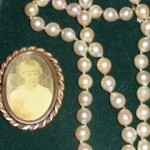Students could be reviewing for exams, but instead want to talk about the project. Although they have really only studied a few of the letters individually, the group shared highlights with one another and then began to offer thoughts on the people involved. I sketched a rough family tree on the whiteboard and answered questions for a while. Some were quick to see the obvious — four marriages, four daughters. Some focused on the subtext, praising Arline and Mercy for their independent spirits, trying to break out of the confines of their 1910 community.
Most students had finished a course in U.S. History, many also completed U.S. Women’s History; they had a good overview of the battle for voting and property rights. Seen in the light of the larger scale of American history, their story is remarkable because it is “everywoman’s” story. They weren’t rich, famous, or privileged. They were just very ordinary women.
The girls who want to continue this summer were especially enthusiastic; some have vowed to write letters home from their adventures this summer rather than rely only on email. The longevity of paper and ink seems to have really impressed them. Who would have thought a few years ago as we were hearing the tech bell to convert to the digital age, that we would learn paper is still preferred for preservation?






Denise:
I am very interested in your project! I would like you to discuss the importance of photographs to the project in my Friday From The Collectors Series on Shades of the Departed.
Would you please email me?
footnoteMaven
footnoteMaven@comcast.net
http://www.shadesofthedeparted.com“ REL=”nofollow”>Shades Of The Departed